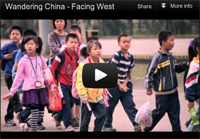This view from the Daily Mail in the UK is one that sees the relationship between China and West becoming rockier.
Chinese vice-premier Li Keqiang, who strode to the podium at Davos with a wave and a smile, “China’s rise will benefit everyone, he argued. His country bought over a trillion dollars of foreign goods last year – the world’s second-largest importer. ‘China’s contribution to world economic recovery is obvious,’ he said. Free trade, he added, must be conserved at all costs.
– – –
MONDAY VIEW: Gloom for the West as China inexorably rises
by Sam Fleming
Source – Daily Mail, 31 Jan 2o10

Tension: Officials in the US and Europe fear relations with China could deteriorate - AP Photo
A statistical recovery, but a human recession. That was the verdict of Larry Summers, one of the few White House emissaries to touch base in Davos for the World Economic Forum.
Barack Obama’s normally brash economic adviser gloomily argued America is facing a ‘structural’ unemployment problem that will not be cured by a few quarters of positive GDP figures. The level of joblessness is ‘disturbing’, he said.
His downbeat assessment could be applied to most of America’s closest allies. Indeed, Davos on occasion felt like a requiem for Western capitalism, as delegates from Europe and the US contrasted the rise of China and other emerging powers with the shattered state of their own economies.
It was, after all, principally the big US and European banks that failed. And while emerging economies are forecast to expand at least six per cent this year, with China motoring up by at least eight per cent, the West seems condemned to near-stagnation.
The bleak prognosis from Summers contrasted with that of Chinese vice-premier Li Keqiang, who strode to the podium at Davos with a wave and a smile.
China’s rise will benefit everyone, he argued. His country bought over a trillion dollars of foreign goods last year – the world’s second-largest importer. ‘China’s contribution to world economic recovery is obvious,’ he said. Free trade, he added, must be conserved at all costs.
But while politicians around the world continue to laud the benefits of Chinese growth, behind the scenes the mood is getting somewhat ugly.
Officials in the US and Europe fear there could be a deterioration in relations with Beijing this year. The stand-off between Beijing and Washington over Google, and the execution of British citizen Akmal Shaikh, are recent examples of serious public fallouts.
Trade relations are also frayed, with Western companies becoming increasingly angry about China’s refusal to offer them a level playing field. A recent report by the EU Chamber of Commerce in China described the country as ‘less and less appealing as an investment destination for European companies’, citing examples of discrimination against foreign enterprises.
Exchange rate policy could be the spark that turns these tensions into something more explosive. For years China has defiantly suppressed the value of the yuan, giving exporters a competitive edge.
True to form, People’s Bank of China deputy governor Zhu Min insisted in a Davos discussion on Saturday that exchange rate misalignments are a ‘small part’ of imbalances that are skewing the world economy.
But that is a view that Western governments are unlikely to tolerate with equanimity, given their exporters’ struggle to gain market share and the haemorrhaging of manufacturing jobs.
If China’s economic success is sustained – which is by no means guaranteed – it could well turn into a running sore. Currencies will jump back to the top of the agenda, something French President Nicolas Sarkozy is already pushing for.
Without progress Western politicians could well start raising trade barriers, as anger about the jobless recovery intensifies.
The White House, which is accused of worrying too much about healthcare and not enough about the economy, will be the key institution to watch.
While protectionism has thus far been the dog that didn’t bark in the global crisis, the topic is clearly exercising the mind of Mr Summers.
The National Economic Council director pointed out that the great American economist Paul Samuelson began to argue late in his life that free trade is not always win-win for everyone.
When a nation’s unemployment is significant, demand is tumbling, and mercantilist policies are being pursued abroad, there can be qualifications to arguments for free trade, said Summers, who is Samuelson’s nephew.
Those words ought to ring alarm bells in Beijing. The relationship between China and the West is about to get much rockier.
Filed under: Charm Offensive, Davos 2010, Economics, Finance, International Relations, Politics












The Sharing Circle